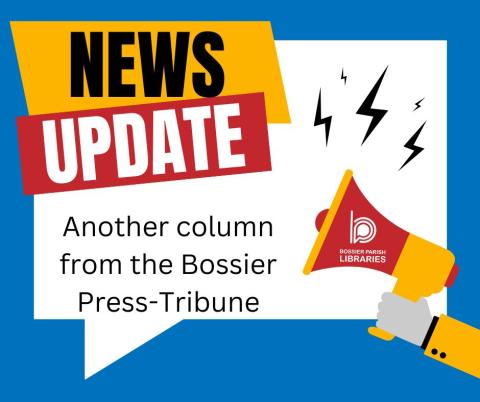
Larry Freeman and the Jewish Journal
May is Jewish American Heritage Month, an annual recognition and celebration of American Jews' achievements and contributions to the United States of America. Here’s a fun fact for that month. The second largest Jewish newspaper in the state of Louisiana, the Jewish Journal, was once published in ‘old downtown’ Bossier City, a.k.a. “the East Bank.” A warning though – some of this story is absolutely not fun, due to the world news that the Jewish Journal was diligently and urgently relaying outside Nazi-occupied Europe as the events unfolded, the Nazi persecution of Jews.
The Jewish Journal began as a monthly publication in Shreveport in 1937 by Larry Freeman, who was a member of the Agudath Achim congregation of Shreveport, that was "published in the interest of Jewish communities." Freeman had lived in Shreveport for several years but was originally from London, England.
The Jewish Journal was not only important for local news, but for news of Jews around the world. News of the atrocities committed against Jews by the Nazi regime was often slow to make its way to the US, and could be met with disbelief or denial. The tragic truth of 1937, the year the Jewish Journal was founded, is that it was the year the first Nazi concentration camp opened, Buchenwald. But an early managing editor of the Jewish Journal, Adolph Phillipsborn, knew first-hand what the Nazis were capable of. He was a Jewish refugee from Germany who arrived in the US in early 1939, not knowing English. Within two years, he was a writer (with a pen name, “Albert Philp”), editor and a speaker to civic groups such as the Bossier Lions Club, urging them not to do business with Nazi Germany.
The Jewish Journal used the Jewish equivalent of a syndicated news service like the Associated Press or the United Press that was called the Jewish Telegraphic Agency (JTA), to gather worldwide news of Judaism and Jewish-related topics. Unlike the UP or AP in late 1939, the JTA was dispatching stories directly from Poland on the rapid intensification of Nazi Germany’s persecution of Polish and other European Jews. Nazis had invaded Poland by September 1st that year; in mid-October, Austrian and Czech Jews were deported to Poland, and by October 28th, the first Jewish ghetto was established in Poland.
In the November 28, 1939, Jewish Telegraphic Agency collection of dispatches, a statement from the Jewish Journal of Shreveport praised JTA reporter Mendel Mozes, who was based in Poland before managing to escape in late 1939, when he had no other choice. The Jewish Journal opined, “If ever a list of American-Jewish journalistic exploits is compiled, high on it must come the name of Mendel Mozes…For his courage and achievements, the Jewish Journal salutes Mendel Mozes, hero of Jewish journalism.”
In September 1945, Larry Freeman purchased the Bossier Tribune, the weekly news publication based out of Bossier City, and its printing shop at 309 Barksdale Blvd., from T.L. Morris for an undisclosed amount. Freeman announced plans to “give Bossier City a complete worthwhile paper, a publication that will devote every effort and influence toward civic, religious, education and industrial upbuilding of the town.” He also announced the Tribune’s commercial printing department would become, “the Twin City Printing Company” and would be expanded. Soon, he was printing the Jewish Journal on his new printing department in Bossier City.
Larry Freeman, along with his wife, Anne Freeman, remained in the local newspaper business for the rest of his life, and also worked to develop and grow downtown Bossier City. He passed away in 1988 at the age of 80. His paper the Bossier Tribune continues as the Bossier Press-Tribune (it merged in the late 1970s with its competitor the Planter Press, and with two north Bossier papers in the 1990’s.) Sadly, the Jewish Journal has not continued, and it is very difficult to come across issues of the paper. Low-quality microfilmed images of two issues from 1941 are available from the Arkansas State Archives in Little Rock, and two issues, from 1944 and 1950, exist in the Eric Brock collection at the Northwest Louisiana Archives at LSU-Shreveport.
If you have any issues of the Jewish Journal, or other documents, stories or photos of religious and community life of Bossier Parish, we would love to add to our History Center’s research collection. Contact us at 318-746-7717 or email history-center@bossierlibrary.org
For other intriguing facts, photos, and videos, be sure to follow us @BPLHistoryCenter on FB, @bplhistorycenter on TikTok.
Article by: Pam Carlisle